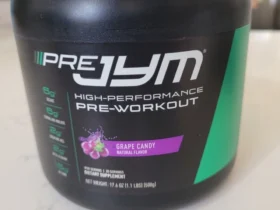
Do Protein Shakes Make You Gain Weight?
For many athletes, protein shakes are an integral part of their diet.
Protein, which can come in many forms, is considered to be the ‘building blocks’ of your body – everything from your skin, your hair, nails, and, of course, muscle, is completely reliant on protein to grow, heal, and regenerate.
The kind of protein that is essential for muscle growth is split into a handful of categories, including whey protein, casein protein, egg protein, and a whole list of vegan protein options, including hemp and bean proteins.
The most popular and common type of protein is whey protein, which is derived from milk. Whey protein is a fast-digesting protein that quickly loads your muscles with all the essential amino acids, promoting muscle regrowth, which builds strength.
Casein protein is more of a slow-digestive protein, as are the vegan protein options. There are options for everyone, regardless of what specifics you might be looking for.
Now, one of the stereotypes about protein shakes and powders is that they taste horrible. In an attempt to compensate for that, companies have begun adding high amounts of sugars and sweeteners to their formulas, thereby increasing the amount of calories per serving.
This (high caloric content) could pose a potential problem.
Depends on Who You Are (Do you Work out or not?)

If your biggest fitness goal is weight loss, then you should do your best to keep your caloric count to a minimum.
Regardless, as long as you are working out at a level that matches the amount of protein you are consuming, you should be gaining muscle mass and losing fat-weight.
What I mean by this is that, if you’re only working out 3 days a week, at only a moderate level of intensity, and you’re also consuming a high amount of protein from whole foods (fish, chicken, steak), then you likely don’t need a protein shake.
If you’re working out 5-6 days a week at a high intensity, you might definitely benefit from an additional protein shake once a day or once every other day.
This is because your muscles tear when you work out – the way muscle mass increases is that, when these torn muscles heal, the endurance and size of the resulting muscle mass is higher. Protein helps this process along.
But the place where protein shakes could cause weight gain (the kind you don’t want) is when you consume protein shakes without working out.
There are, of course, a ton of factors to consider here. What kind of protein you are consuming? How often are you having the shake? Do you have the shake and eat food? Do you use the shake as a meal replacement? Does the shake you use have a high sugar and calorie content?
In general, protein shakes are only beneficial to people that are working out at a high intensity virtually all the time. Otherwise, because of their general high sugar and calorie count, drinking protein shakes when you don’t need to can easily result in weight gain.
There are, of course, exceptions where protein shakes are low in sugar and are viable low-calorie alternatives to snacks or meals.
Gainer Protein Shakes

For the athletes that are trying to lose weight, diet proteins are a great option. Diet protein powders are much lower in calories, and are generally healthier than regular protein powder.
An example is Nutiva Organic Hemp Protein, which contains only 90 calories, 1 gram of sugar, and 15 grams of hemp protein.
Like I mentioned earlier, these kinds of diet proteins are the complete opposite of gainer proteins. The goal with the diet protein is to drastically limit caloric and sugar intake, which is one of the most vital aspects of weight loss – excess calories and excess sugars are converted into fat stores.
Diet Protein Shakes

For people that are looking to gain weight (in muscle) there are protein powders out there designed for body builders. These are called gainer protein shakes. They come super-loaded with protein and calories.
One example of this is the True Mass protein powder, which contains 1220 calories and 50 grams of sugar per serving.
Obviously, if you consume this protein powder and don’t work out, you will almost definitely gain weight.
But if your goal is to gain muscle mass, this is how bodybuilders do it – high calorie, high protein. These gainer protein shakes are much different than diet protein shakes – they are in fact, polar opposites.
If You Don’t Work out, Try This

If you are a person who doesn’t work out, but still likes to use protein shakes as a meal replacement, don’t worry, there are options.
A general rule of thumb is to use the healthiest, most natural protein powders as meal replacements – as long as you’re drinking it anyway, try to get a healthy serving of vitamins, nutrients, and minerals as well.
One of the best options in this realm is the Orgain Organic Plant Based Protein + Superfoods Powder. This powder contains 160 calories, 21 grams of plant-based protein, 1 gram of sugar, and an ingredients list that is absolutely loaded with an incredible variety of superfoods derived from fruits and vegetables.
If you really need to use a protein shake as a meal replacement, this, or a similar option is your best bet.
So yes, drinking protein shakes can make you gain weight. It just comes with a few caveats.
But, as long as you monitor the amount of calories and sugars you’re consuming with your protein shakes, in addition to the type and amount of food you eat, you should be able to determine whether or not you really need to be drinking them.
If you don’t need to drink a protein shake, there’s no reason to have one. And that – abstinence – is your best chance at avoiding weight gain from protein shakes.

Article by:
Daniel DeMoss
I’m a personal trainer based in Denver (Matrix Gym) and a true fitness nerd. If I’m not training clients or working out at my home gym, I’m probably skiing, cycling or hiking with my dog Rufus.
Get in touch: daniel@dumbbellsreview.com







